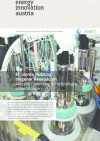Suchergebnisse
IEA Windenergie Task 27: Kleinwindkraftreport Österreich 2015

Die Studie gibt einen Überblick über den Kleinwindkraftmarkt in Österreich.
Kurt Leonhartsberger, Kathrin Renz
Herausgeber: Institut für Erneuerbare Energie, FH Technikum Wien
Deutsch, 44 Seiten
Downloads zur Publikation
IEA Bioenergy Task 39: Algae Bioenergy - State of Technology Review

Das Webinar fand am 25. Jänner 2017 statt und hob die wichtigsten Ergebnisse und Erkenntnisse aus dem gleichnamigen Bericht hervor. Ziel war ein Update zum Thema Mikro- und Makroalgen als Rohstoff für Bioenergie und Biotreibstoffe.
Lieve M.L. Laurens, James D. McMillan
Englisch
Downloads zur Publikation
Effiziente Nutzung biogener Ressourcen

Aktuelle Forschung & Technologieentwicklungen
energy innovation austria
3/2017
Herausgeber: BMVIT und Klima- und Energiefonds
Deutsch, 8 Seiten
Downloads zur Publikation
Bioenergy Task 40 Studie: Global wood pellet industry and trade study 2017
Die Studie gibt einen detaillierten Einblick in die Entwicklung der Holzpelletmärkte in und zwischen 36 Ländern und Regionen sowie eine Einschätzung der derzeitigen Rahmenbedingungen und zukünftiger Trends.
Anpassung und Auslegung von Pumpspeicher-Kraftwerken
Neuentwicklung eines Wasserschlosssystems von Pumpspeicherkraftwerken zur Beherrschung der geänderten Netzanforderungen zufolge vermehrter Einbindung von regenerativen volatilen Energieträgern.
BIMaterial Process Design for Material Building Pass
Building Information Modelling supported compilation of a Material Building Pass; as a qualitative and quantitative documentation of the material composition of, and the material distribution within, a building structure. This project is a central milestone towards standardized, BIM-generated building material passes.
Plus-Energie-Büro - Plus-Energie-Bürobau der Zukunft
Mit der technischen Konzeption und Detaillierung eines Plus-Energie-Büros unter wirtschaftlichen und rechtlichen Marktbedingungen soll die Machbarkeit solcher Projekte am Beispiel eines konkreten Büroprojekts mit einer BGF von 8.000 m² im Rahmen der betriebswirtschaftlichen Kostenbetrachtung dargestellt werden.
Semimanuelle Demontage von Elektro(nik)-Kleingeräten
Optimierung der in der Sozialwirtschaft eingesetzten Technologie der manuellen Demontage von Elektro(nik)-Kleingeräten. Über, auf die Analyse von Demontageprozessen abgestimmte, Software-Module von der Demontagefabrik zum Demontagepark.
EMA - Environmental Management Accounting - Pilottesting
Beispielsammlung zur Umweltkostenrechnung und Investitionsrechnung
IEA 4E Mapping and Benchmarking
Im Rahmen der M&B Arbeit wurden Haushalts-Kühlgeräte, Geschirrspüler, Settop boxen, Transformatoren, und Beleuchtung analysiert. Der Endbericht fasst die relevantesten Ergebnisse und M&B Publikationen zusammen und stellt für 2015-2016, die Arbeit für Elektromotoren, verbaute Flüssigkeitskühlsätze und Wasserheizkessel vor.
Innovativer Solarregler für thermische Solaranlagen
Erforschung der technischen Machbarkeit eines Solarreglers für thermische Solaranlagen, welcher ohne konventionelle Kollektor- u. Speichertemperaturfühler auskommt
1. Ausschreibung bis 20. September geöffnet
Projektanträge können bei der Forschungsförderungsgesellschaft eingereicht werden. Genauere Informationen und Kriterien entnehmen Sie bitte dem Ausschreibungsleitfaden.
Leitfaden für Projekteinreichungen online
Ab sofort sind mit dem Leitfaden detaillierte Informationen über Ausschreibungsinhalte und Einreichmodalitäten verfügbar.
Messe: CLEAN ENERGY POWER® 2006
18. Jan 2006 -
19. Jan 2006
ICC BerlinBerlin, DE
Internationale Ausstellung und Kongress für Erneuerbare Energien, energieeffizientes Bauen und Sanieren
Conference: World Sustainable Energy Days
26. - 28. February 2014
Wels, AT
Annual international conference offering a unique combination of events on sustainable energy.
Conference: Smart Grids Week - Bregenz 2012
May 21st - 25th, 2012
Bregenz Festival House and illwerke vkw6900 Bregenz, AT
The Smart Grids Week - Bregenz 2012 is to contribute significantly to the development of electricity infrastructure in Austria and to continue the interconnectionprocess with international developments.
Auftaktveranstaltung "natureplus"
Mittwoch, 5. Juni 2002, 14.00 - 16.00 Uhr
DAZ - Deutschen Architektur Zentrum Köpenicker Str. 48/49, D 10179 Berlin Mitte
Erstmalige Auszeichnung von Produkten aus Deutschland, Österreich und der Schweiz mit dem natureplus-Label. Es handelt sich um Dämmstoffe aus nachwachsenden Rohstoffen, um Holzwerkstoffplatten und um Dachziegel.
Projektforum Smart Grids 2009
29. Mai 2009
edu4you Bildungsakademie
1090 Wien, AT
Das Forum hat zum Ziel, die Vernetzung aktueller F&E-Projekte und die Entwicklung eines gemeinsamen Gesamtbildes des international stark an Bedeutung gewinnenden Forschungsthema Smart Grids zu forcieren.
Info-Workshop zum IEE-Call 2009
27. April 2009
Österreichische Energieagentur, Mariahilfer Straße 136
1150 Wien, AT
Präsentation der inhaltlichen Schwerpunkte des IEE-Calls 2009 und Vorstellung der Einreichmodalitäten.
Development of a GIS-Onlineplatform for the forestry
Development of a GIS-Onlineplatform for the forestry which enables its users to carry out all necessary tasks online: the complete data of forest work can be viewed, changed and newly calculated at any time, including the ability to control machine-use more efficiently right at the beginning of use.
